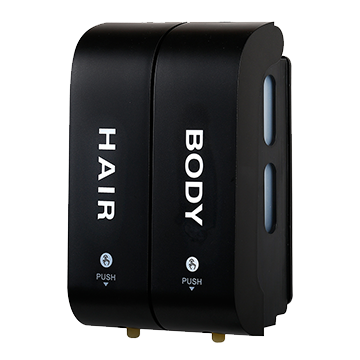May 30-May 30 – Sacramento – The small shampoo and conditioner bottles popular with travelers but unpopular with anti-plastic advocates would be banned from hotels in California under a bill that passed the state Legislature on Wednesday.
The accompanying shower product is the latest convenience product to catch the attention of lawmakers, who have previously targeted single-use plastic items such as grocery bags and straws to reduce plastic pollution.
Assembly Bill 1162 drew vitriolic responses from Republicans and nanny state criticism after it was introduced, but no lawmakers voiced opposition Wednesday. The bill passed with the minimum required for a majority in parliament, 41 votes to 23.
The bill’s author, Assemblyman Ash Kalra (D-San Jose), said small plastic bottles in hotels may be convenient, but they also damage the environment.
“Those tiny plastic shampoo bottles commonly found in hotel rooms represent a huge amount of waste that can be easily eliminated with more cost-effective and environmentally friendly alternatives,” says Kalra.
AB 1162 will take effect in 2023 for hotels with more than 50 rooms and a year later for all other hotels and rental properties. Hotels can still provide guests with small bottles of shampoo and other personal care products upon request.
The Personal Care Products Council, a trade group representing manufacturers and distributors of small shampoos, conditioners and soaps, opposed the bill, saying it would hurt businesses that sell to hotels.
“I’m not a big fan of bans, I love these” products, Assemblyman James Gallagher (R-Yuba City) said at a hearing in April. “I collect them in my hotel room.”
California Hotel and Lodging Association. Supported the bill, saying some of the world’s largest hotel companies, including Marriott and intercontinental Hotels, have been phasing out small refill bottles and replacing them with large shower dispensers.
Marriott officials say they expect that by stopping each 140-room hotel from storing mini shampoos and conditioners in their rooms, they can save an average of 250 pounds of plastic a year — or 23,000 plastic bottles.
“It’s estimated that there are as many as 5 billion of these little bottles in California rooms in one year,” Kalra said, adding that the bottles are difficult to recycle because of their size and the residue left inside.
To avoid dead stock of amenity bottles, distributors can encourage their customers to switch to amenity dispensers.
Allocators come in a variety of styles. Some can be replenished continuously with refillable bulk body wash, shampoo or conditioner. Other models use separate, replaceable sealed cartridges. Each cartridge lasts about a month, and more than 200 convenience bottles are replaced.
Unlike bottles, dispensers have no product waste, as cartridges can be left in place until soap or shampoo is completely used. Room service can monitor soap levels through a window in the dispenser. Even if the cartridge looks low, there’s a hidden sink with enough product for another 15 showers. Refillable units can be topped up during room cleaning.
“After people finish [a bottle] and leave it in the shower, butlers have to dispose of it,” says Jesse Chacon of Janitorial Emporium in Torrance, California, a distributor. “[The dispenser] is basically 100 percent shampoo and conditioner.”
Not having to collect and replace partially used convenience bottles can save the housekeeper a lot of time to repair the room.
“It’s easier than going up and down the room service van to refill the plastic bottles in every bathroom,” Burger says. “Typically, dispensers or amenities can be refilled every two weeks. It’s not labor intensive.”
Being able to use up all body wash or hair products before discarding them can save hotels and other lodging properties a lot of money.
“Hotel and motel businesses provide personalized amenities for individuals and… Sometimes the housekeeper will renovate it the next day, “Chacon said. “But [using the dispenser] is more beneficial to hotels because it can save them a lot of money.”
According to the American Hotel and Lodging Association in Washington, D.C., hotels in the United States threw away nearly 1 million individual convenience bottles in 2009. AHLA says an easy way for lodging companies to save money is to install a water cooler system.
Some of the reasons stated by the AHLA are:
- Liquid soap in bulk is cheaper;
- Reduce the impact of waste; and
- It improves quality control.
In the case study conducted by AHLA, using a 300-room hotel as an example, installing two distribution systems per room (one in the shower and the other near the sink) resulted in an estimated annual savings of $10,512. This takes into account a dispenser cost of $32 per unit, an installation cost estimated at $8 per room, and a hotel occupancy rate of 60%. The total investment is estimated at $12,000, which means that the investment will appear after one year.
“In general, hotels save 30 to 70 percent when they move from a separate packaging facility to one that uses dispensers or is equipped with gallon products,” Burger said.
Throwing away such a large number of individual bottles is not just a waste of money; It’s a strain on the environment. Millions of these little bottles don’t get recycled, don’t fill landfills, or worse, end up in the ocean.
By contrast, a single cartridge in the amenities dispenser prevents up to 200 bottles from entering the landfill.
“It’s much more environmentally friendly for the hotel and the environment because they don’t have to worry about all these individual bottles,” Chacon said.
Some hotels have set up convenience bottle recycling stations, but these programs rely on guest participation. Using an amenities dispenser, butlers can recycle cartridges.
There are also environmental benefits from a manufacturing and shipping perspective, as the carbon footprint of the individual bottles is larger than that of the dispensers.
“It reduces shipping because you don’t have to ship as often,” Berg said. “The environmental benefits are significant.”



